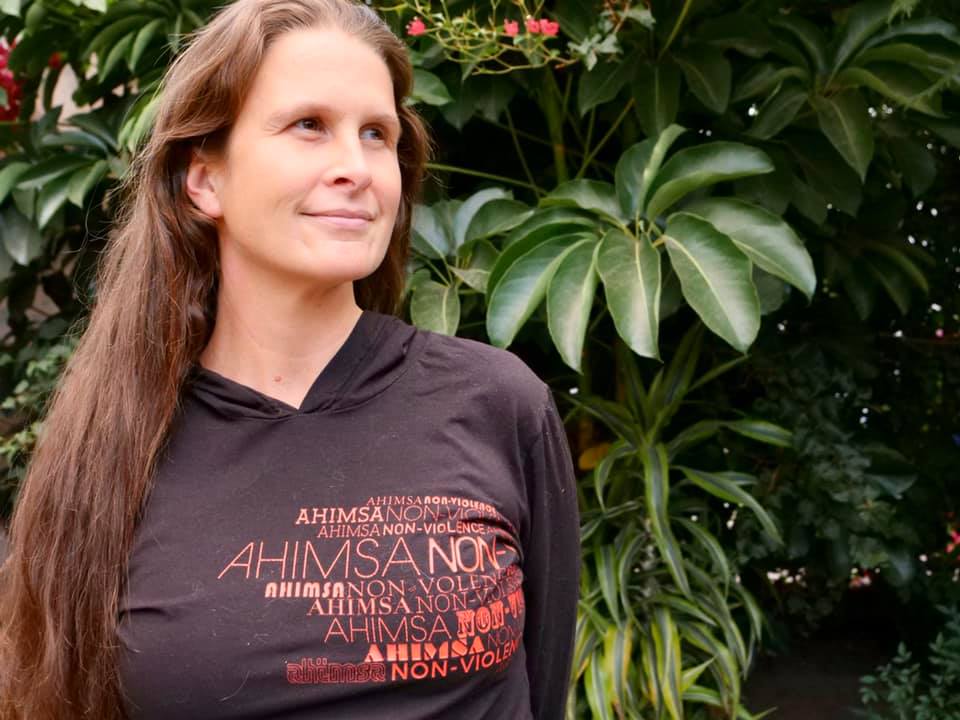An anthropologist proposed a game to the children of an African tribe. He put a basket of fruit near a tree and told them that whoever reached the tree first won the sweet fruits. In response, they all joined hands and ran toward the tree as a single group, sitting together afterward to enjoy their treats. When he asked them why they acted in this way, instead of trying to win the fruits all for themselves, they replied, “Ubuntu…how can one of us be happy if all the other ones are sad?” A philosophy of African tribes, ubuntu essentially means, “I am because we are.”
As yogis, I believe our primary job is to uplift others by reflecting their divine nature back to them. We may do this through all aspects of our lives, including our business practices. Many people spend a good portion of their waking hours at work, along with their co-workers. This offers an amazing opportunity to bring a non-competitive, yogic state of mind into the workplace. Whether you are a yoga instructor, daycare provider, flight attendant, or a stay-at-home parent, infusing the eight limbs of yoga into your work ethic and business interactions uplifts those around you.
Many businesses in modern society operate on a competitive business model. Yogis seek to replace this old, outdated model with one of creativity and cooperation. In this way, new and wonderful possibilities may present themselves that increase overall morale and prosperity.
A business operating on a competitive model often drains and steals energy, depleting its staff, customers, and clients of their freedom, health, kindness, and prosperity. A business operating on a cooperative model generously supplies its staff, customers, and clients with those same important elements. Competitive businesses take. Cooperative businesses give.
The practice of nonstealing, known as asteya in Sanskrit, connects with prosperity in our lives as well as the lives of others. According to Patanjali’s Yoga Sutras, this yama—or suggestion of how to treat others—bestows a blessing upon those who establish themselves in the practice of nonstealing. These individuals receive prosperity in all its forms, including mental, physical, spiritual, and financial abundance. Asteya encompasses all actions that have the potential to drain, exhaust, and deplete the energy and—in some cases—the lives of others.
Asteya refers to both direct and indirect acts of stealing. Taking someone’s life is obviously one of the most extreme ways to steal from another. Sadly, this is something that happens every day, when humans exploit other beings for food, clothing, entertainment, and other purposes.
I find it interesting that the word capital derives from the Latin word, capitalis, which means “of the head,” and refers to a head of cattle. The stock market was the first entity to refer to cattle as “livestock,” a term that describes other beings who are bought and sold by humans. And, of course, the word “war” comes from the ancient Aryan Sanskrit word, gavyaa, which translates to “the desire for more cattle.” So much of our economy today is based on taking, typically to increase financial status, without regard for the lives of others.
We reference a subtler form of stealing when we utter phrases like, “This job is sucking the life out of me,” to describe a depletion of our personal energy in the workplace. A drainage like this occurs when we operate within a competitive mindset, since this is an exhausting state of mind. While they seem different on the surface, we may compare this loss of energy to the more direct acts of stealing, outlined above. In all cases, the individuals with the “upper hand,” which comes with the attitude of domination and superiority, believe that they gain some benefit by taking from other beings, either with or without their consent.
Often the word “cutthroat” is used to describe a highly competitive person, business, or organization. A cutthroat person, or business, is willing to take and take and take—with no respect for others—to increase their own profit or advantage.
Yoga teaches us that the opposite is true. The more we give, the more abundance and prosperity we receive. Asteya refers to doing everything possible to give freedom to others, as opposed to stealing away their lives. Those who wish to live in prosperity and abundance do not take these same qualities away from others. When we allow other beings to be free, to make choices, and to be prosperous, we disconnect from a competitive frame of mind. When we are sincere in our practice of asteya, all forms of prosperity and abundance manifest in our lives.
Our businesses reflect our morals and values. For me personally, the idea of competition holds little value or importance. I do believe it is of great value to work to create non-competitive environments that operate under a consensus model so that everyone may expand their gifts of creativity, cooperation, and connectedness. Collaborating with others who share our core values is a vital part of being creative and offering prosperity to others. When we choose to run a business with a competitive business model, we disconnect from our yogic values and run the risk of creating an aggressive environment.
Competitive businesses are rooted in fear. They often use catchphrases such as “number one,” “best,” and “highest,” when describing their company. This implies that all other businesses are second rate or not good enough. These businesses often fear that prospective customers and/or clients may choose to take their business elsewhere, so they use catchphrases to draw people in, rather than being creative, cooperative, and inclusive in the workplace.
I believe a yogi’s goal is to realize the interconnectedness of all life, to experience peace and freedom, and to be of service to all beings. Competitively operating a business does not serve others. Since a competitive mindset is deeply ingrained in our society, many people are drawn to these same catchphrases, “number one,” “best,” and “highest,” among others. It is tempting to think we must run our business competitively to be prosperous, but this is not the case. Naturally, competitive businesses do make money, but they often do so by taking advantage of others and compromising their own values and morality. There is a significant difference between being successful and being prosperous. “Success” is a word frequently associated with a competitive business model; it is measured through financial wealth, position, or status. Rather than focus on competitive success, I believe in focusing on prosperity in all aspects of my life—mental, physical, spiritual, financial, and more.
Many speak of noncompetition, but their actions do not reflect their words. When there is an attitude of being the “best,” it feeds the unhealthy ego of the business owner, and filters down to staff members, clients, and customers. Even when we operate on a creative and cooperative model, we may realize that partnering with a competitive company affects our ability to maintain harmony, cooperation, and inclusiveness in our own business practices. It is not easy to remain steadfast, cooperative, and creative in an environment where others operate from a place of fear, competition, and exclusivity.
It is a daily practice for yogis to actively strive to create an atmosphere of cooperation, harmony, and connectedness in both their personal lifestyles and business practices. The ways in which we operate our businesses may draw us closer to, or further away from, the yogic goal of peace for all beings. Yoga is the state of inner peace. Money does not draw us closer to yoga or make us more peaceful. Yoga, however—being present in a state of peace and connection—brings both money and prosperity into all aspects of our lives.
Creativity and Cooperation Replace Competition: Yogic Business Model
| Creative Mind | Competitive Mind |
| Creation cooperates | Competition conflicts |
| Opportunity | Failure |
| Delighted and fulfilled | Proud |
| Honor and self-respect | Pride |
| Self-esteem and self-acceptance | Self-confidence |
| Inclusive | Exclusive |
| “One of the best” | “The best” |
| Allows limitless energy to flow | Cuts off limitless flow of energy |
| Faithful | Fearful |
| Gives through gratitude | Takes through greed |
| Purchase and buy | Sale and sell |
| Service with a shared dedicated purpose | Self-serving without a shared dedicated purpose |
| Co-creative and collaborative | Controlling and manipulative |
| Self-affirming, growth-oriented model | Punishment or reward, lose or win model |
| Balances purpose with profit | Solely focused on profit |
| Generates income by collaborating with others | Generates income at the expense of others |
| Sustainable | Unsustainable |
For further details about running a business more creatively, please check out Greg Nielsen’s book, MetaBusiness.
Anna Ferguson is the co-creator of World Peace Yoga, a style of yoga that inspires peace in action, developing intuition, deepening empathy, and expanding compassion. You may connect with Anna via Facebook.

